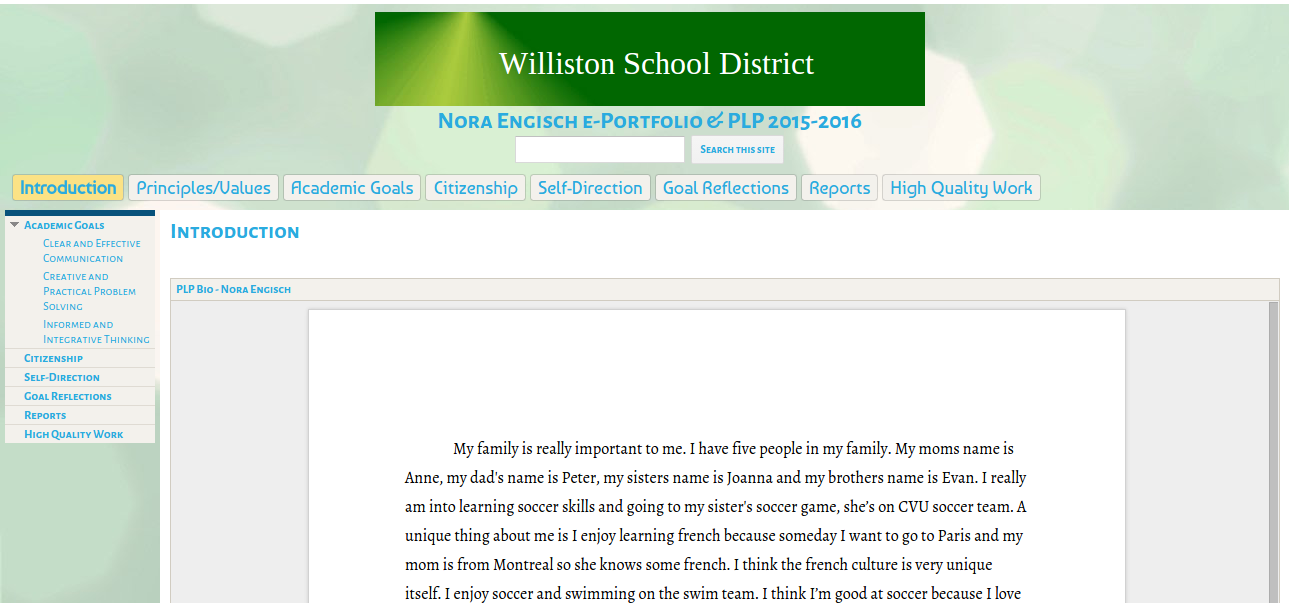Swift House: PLP History Part 3
This week we will be featuring the final installment in a series of blog posts from Kevin Hunt, a contributor to PLP Pathways and teacher in the Swift House, Williston Central School.
PLP Pathways encourages contributions from teachers and educators across the state who are implementing personalized learning or, like Kevin, have integrated it into their programs. This week, Kevin discusses the process for linking goals and evidence, communications with parents, and student-led conferences.
[Swift House] students also have an opportunity to input evidence to their various goal pages. For every piece of evidence that they embed, whether it be a document, presentation, video, or image, the students need to include a couple of sentences on how each piece of evidence directly relates back to their goals. This process of having students write about how their evidence connects to their goals both assures that the evidence they are including has relevance for that specific goal page, and it gives the students another opportunity to reflect and notice the progress that they have made toward reaching their goal. This wouldn’t be as fluid of a process if we did not have flexible scheduling and a house-based team structure. We all are generalists who teach the same content at the same times during the school day. The fact that there are pockets of time within our schedule that we have our entire [Swift] student body present, allows us to make changes to our schedule as needed.
In each core class, we also pair 5th grade students with mentor 7th and 8th grade students. These mentor/mentee pairs are created before the beginning of the school year and the mentors have an opportunity to meet their mentees before the first day of school to introduce themselves and give them some advice from a student’s perspective. We often utilize our mentors during PLP time. Our 7th and 8th grade students, who have already had two-to-three years of experience with our PLP process, work with their mentees to assist them in finding evidence and linking work to their portfolios.
By the end of each trimester, students have at minimum four pieces of evidence (with connections) for each goal, a goal reflection, which states the importance of the goal, successes with meeting the goal, challenges, and next steps, and their various class reports. These pieces are all outlined in their PLP checklist and are reviewed during their student-led parent-student-teacher conferences.
Parent Involvement = Greensheets (Friday Sheets)
Students on Swift House complete a weekly Friday sheet that acts as a communication tool between school and home. Students receive these Friday sheets on Thursday and are required to get either an initial from their teachers of their various classes or a circle. An initial represents that students are caught up with all work and have nothing overdue. If a teacher puts a circle next to the class, that indicates that the student owes either classwork or homework, and the teacher will indicate and write down what is owed. Students bring home the Friday sheets over the weekend and bring them back, with a signature from their parents, by Monday. The parents also have an area to initial that indicates that they have taken the time to review their son or daughter’s PLP weekly goal reflection and evidence. This weekly communication assures us that our students parents are being kept in the loop regarding their child’s weekly progress, as well as let us know that they have taken the time to review their child’s PLP, or at the very least acknowledge its existence.
Student-led Conferences
At the end of each trimester, teachers conference with students and parents to review their PLP progress and go over their class reports. These conferences typically last thirty to forty-five minutes and are led by the students. Students spend the majority of time showing their online portfolio, which houses their various PLP goals and evidences. After each goal is reviewed, the PLP team has a conversation about the student’s progress and discusses whether or not the student would like to keep the goal, tweak the goal, or change the goal completely. This provides a wonderful opportunity to students to advocate for themselves and take full control over their learning.
